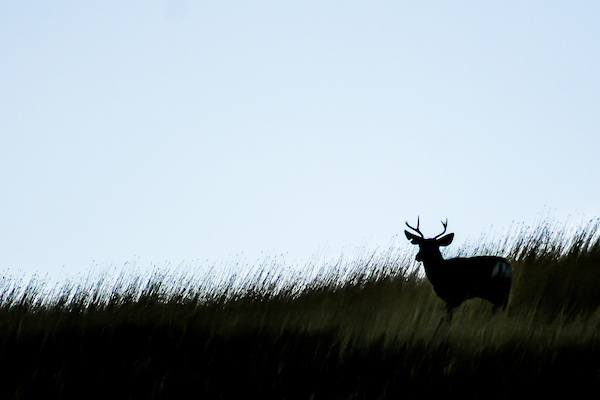
Groups Lobby Inslee On Fish And Wildlife Commission Appointments
Pro-hunting and preservationist-oriented groups are urging Washington’s governor to fill two empty Fish and Wildlife Commission seats.
Dueling letters were submitted this week by a slate of some of the most venerable conservation organizations in the state – the Wenatchee Sportsmen’s Association, Ducks Unlimited and Inland Northwest Wildlife Council, among others – and some of the most litigious – Washington Wildlife First, Wild Fish Conservancy, Center for Biological Diversity, et al – asking Jay Inslee to accept their advice.

“The undersigned organizations urge the Governor to advance commissioners who understands science-based wildlife and habitat management, including the nuances of predator mitigation and management objectives, as well as the impact to and protection of First Foods for indigenous people, which include salmon, elk, and deer,” argue 10 hunting organizations. “We believe wildlife management in Washington should be undertaken by Commissioners who will lead with pragmatic decision-making in full consideration of recommendations from the Washington Department of Fish and Wildlife in accordance with its mission.”
Others signing onto that letter included Backcountry Hunters & Anglers, Theodore Roosevelt Conservation Partnership, Richland Rod and Gun Club, Western Bear Foundation, Inland Empire Safari Club International, Northwest Sportsmen’s Club and Sportsmen’s Alliance.

State the more than two dozen-plus environmental groups, “Governor Inslee, the hundreds of thousands of Washington residents who support our collective organizations are among your most devoted supporters. We care deeply about our environment, and are dedicated to fighting climate change, preserving biodiversity, and countering the increasingly powerful ‘anti-science’ agenda of which you [Governor Inslee] often speak. We are asking you to demonstrate that you care just as deeply about the threats to biodiversity within Washington as you do about environmental threats at the national and international level.”
Other signatories to that letter are the Humane Society of the United States, Mountain Lion Foundation, Conservation Angler, Humane Voters of Washington, Sound Action, Northwest Animal Rights Network, Western Watersheds Project, Kettle Range Conservation Group, Orca Relief Citizens Alliance, WildEarth Guardians, Coastal Watershed Institute, Endangered Species Coalition, Western Wildlife Conservation, Predator Defense, Friends of the White Salmon River, Animal Wellness Action, Cascadia Wild, Western Wildlife Outreach, Project Coyote, Animal & Earth Advocates, Whale and Dolphin Conservation, Coexisting with Cougars in Klickitat County, Project Zangle Cove, Animal Legal Defense Fund and Terrestrial Wildlife Program.
To be clear, even if the latter list looks bulkier, the managing partner of one of the environmental groups is also the president of another in the mix, padding the wordcount.
In the middle of all this pressure on the governor is WDFW, which is overseen by the commission.
Agency director Kelly Susewind spoke about the citizen panel during Thursday night’s Region 1 virtual open house. He was answering a question from the public about whether members should be voted into office, which he was not in favor of.
“I think what we need, and I had a call with the Governor’s Office today to explain that I really don’t care [about] the affiliation of potential commissioners. I hear it should be all hunters and fishers. I frankly don’t agree with that. Some of our strongest proponents for hunting and fishing on the commission don’t hunt or fish themselves and they’re incredible advocates for those consumptive activities,” he said.
“What we need is smart, open-minded people that will put the resource first and try to make sure that we have a good functioning commission and agency. Give me that and I could care less of their affiliation or their background. If they’re there with an open mind and they put the resource first, we will do well.”
“We’ve got a fabulous staff. We go through a lot of work to come up with our recommendations. I think they’re solid. I think that open-minded person will be convinced by our arguments by our great staff. And if they’re not, we better pause and say, ‘Hey, here’s a smart, open-minded person that’s not quite agreeing with us. What’s that mean?’ I think that’s the healthy answer.”
“I think the Fish and Wildlife Commission is the right structure. I think it could provide the right buffer from gubernatorial politics and other politics. It just needs to be implemented in a fair and consistent manner and we’ll be fine,” Susewind said.
The reason there are two available seats is that for nearly an entire year, one Eastern Washington position has gone unfilled by the Governor’s Office since the end of Dave Graybill’s term. That has left two-thirds of the state with only two landed representatives, with the six other members all from west of the Cascades, though some fill “at-large” seats.
And early this week, Fred Koontz resigned from his position, citing “a politicized quagmire” amongst the membership.
Certainly the commission has seen more divided votes of late than, say, during the mid-2010s when, if memory serves, many decisions under Chairs Miranda Wecker and Brad Smith were unanimous.
Most infamous is November’s 4-4 tie on the 2022 spring bear season proposal. That led to gut-reaction online and resident petitions to reverse it, but late this week emerged a much more robust challenge from the Inland Northwest Wildlife Council.
Marie Neumiller, the Spokane-based organization’s executive director, cautioned that, even if the commission accepts the petition at its January 21 meeting, it would still need to go through the rule-change process, which can be lengthy and may not wrap up before the proposed April 15 start of next year’s limited-entry hunt.
“But we are hoping that this will close the ‘loophole’ that caused the spring season to be canceled, and as a result will protect future seasons from lawsuits and failed votes,” Neumiller said.
The “loophole” is that the hunt is reset annually for a specific year, e.g., 2021, so when the 2022 proposal tied, it short-circuited the season.
“There are no guarantees that our effort will succeed, but we feel this is one step in a long process. The effort is worth it if we can bring attention to the value of the season and appropriate predator management,” said Neumiller.
The need for predator management has become increasingly clear in the Blue Mountains where the local elk herd is in “crisis” and suffering “exceptionally low” calf survival rates, according to a study of 125 collared calves, just 11 percent of which were still alive after less than half a year on the landscape.
Annual elk calf survival should be at least 17 percent up to 57 percent.
Koontz and Lorna Smith early this month argued the solution was to lower the herd objective and reduce hunting further instead of address the cougar predation that will keep the elk from rebounding.
“Please, Governor Inslee, assert your political courage to stand up with us for fish and wildlife of our state,” argue the environmental groups, many of which previously urged the state’s chief executive to appoint more commissioners like Smith and Koontz.
Also pitching Inslee, INWC, BHA, TRCP, et al, write, “We urge the Governor to carefully consider the qualifications of any candidate’s ability to fulfill the mandate of the Commission, including the responsibility to ‘maximize hunting opportunities’ and allowing the department to ‘preserve, protect, perpetuate, and manage the wildlife’ (RCW 77.04.012). For the wellbeing of our public lands, waters, and wildlife, it is imperative that your appointments are individuals who engage the role with a vested interest in hunting and angling as an essential function of the North American Model of Wildlife Conservation.”
I guess this is where I step away from straight-ish-ish reporting and offer some analysis.
I would be much more comfortable with more actively licensed hunters and anglers on the commission.
But I also want to reiterate something Director Susewind said the other night: “Some of our strongest proponents for hunting and fishing on the commission don’t hunt or fish themselves and they’re incredible advocates for those consumptive activities.”
As a reporter you learn weird, mind-bending sh*t sometimes. Recently for me it was that the commissioner I’ve seen standing up for sportsmen over and over perhaps the most the past year, year and a half, is actually a vegan.
A vegan, person who doesn’t eat meat, which is the primary reason most of us fish and hunt.
I also think back to the contentious Jay Kehne confirmation in the state Senate and what a great commissioner he turned out to be.
The Governor’s Office has a very tricky exercise ahead. Susewind’s “resource” is not just the state’s fish, wildlife and habitat, but those who care deeply about it and who can be harnessed for the good of all.

